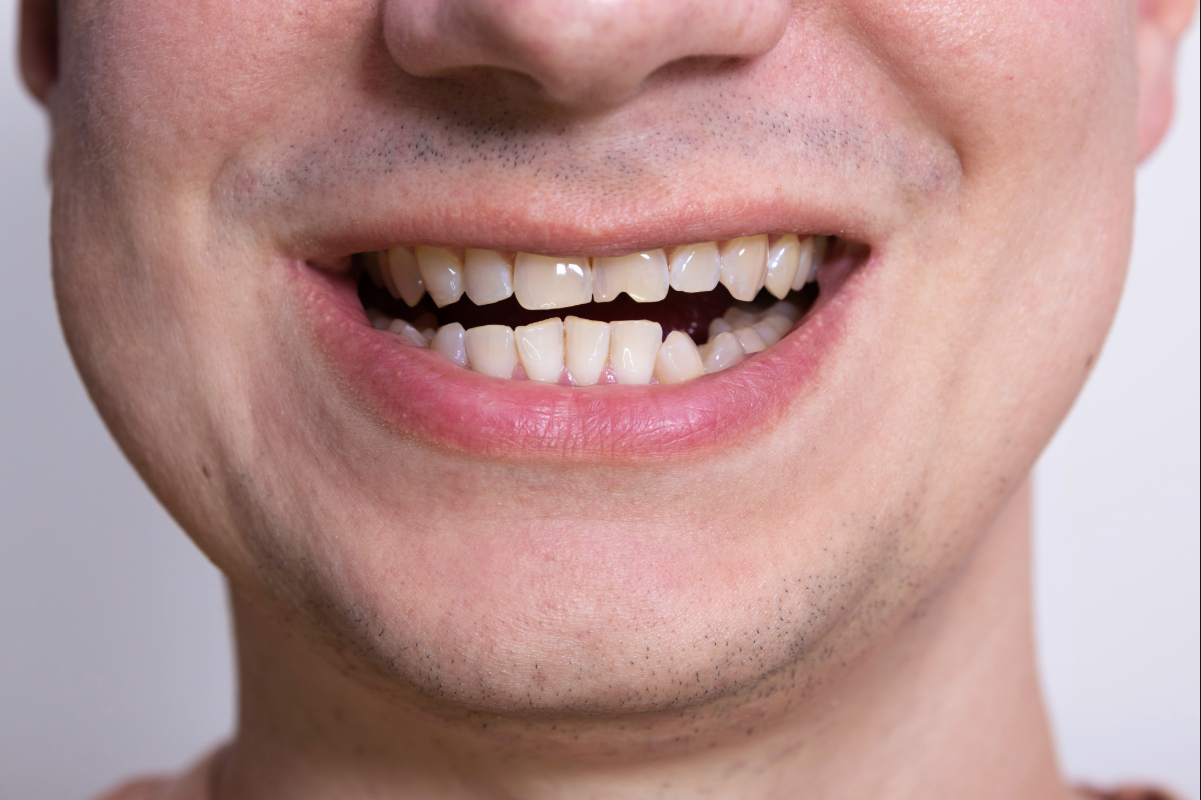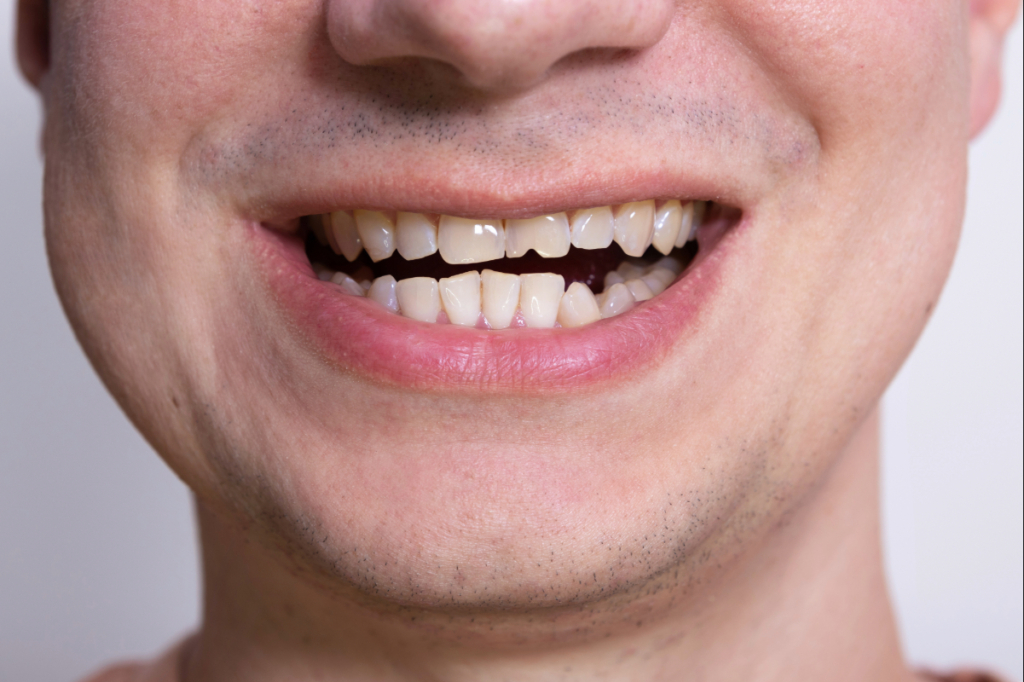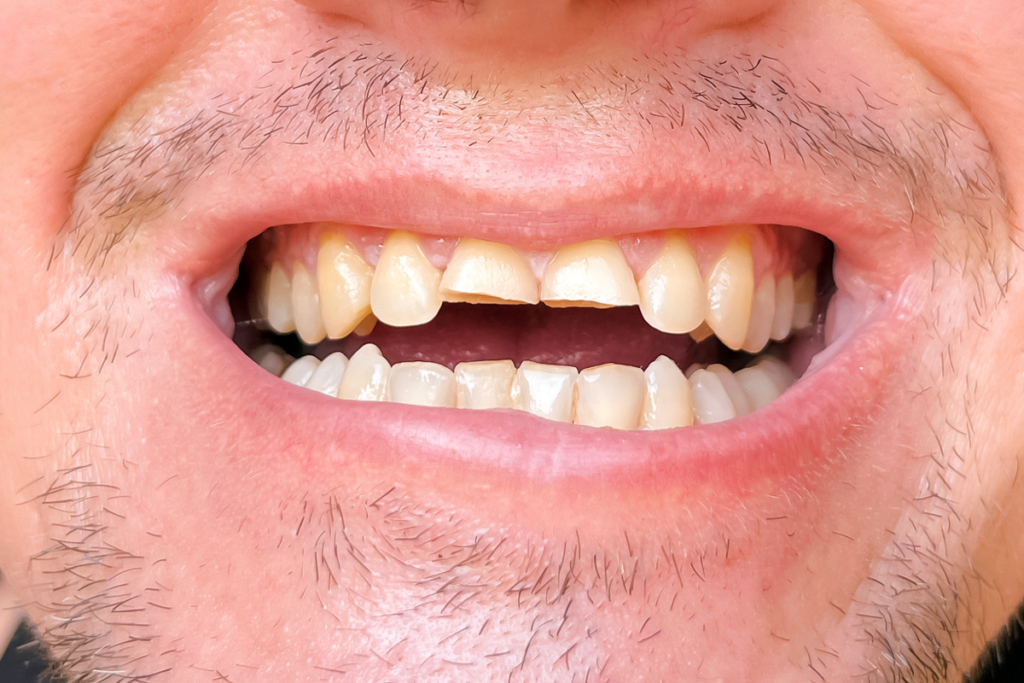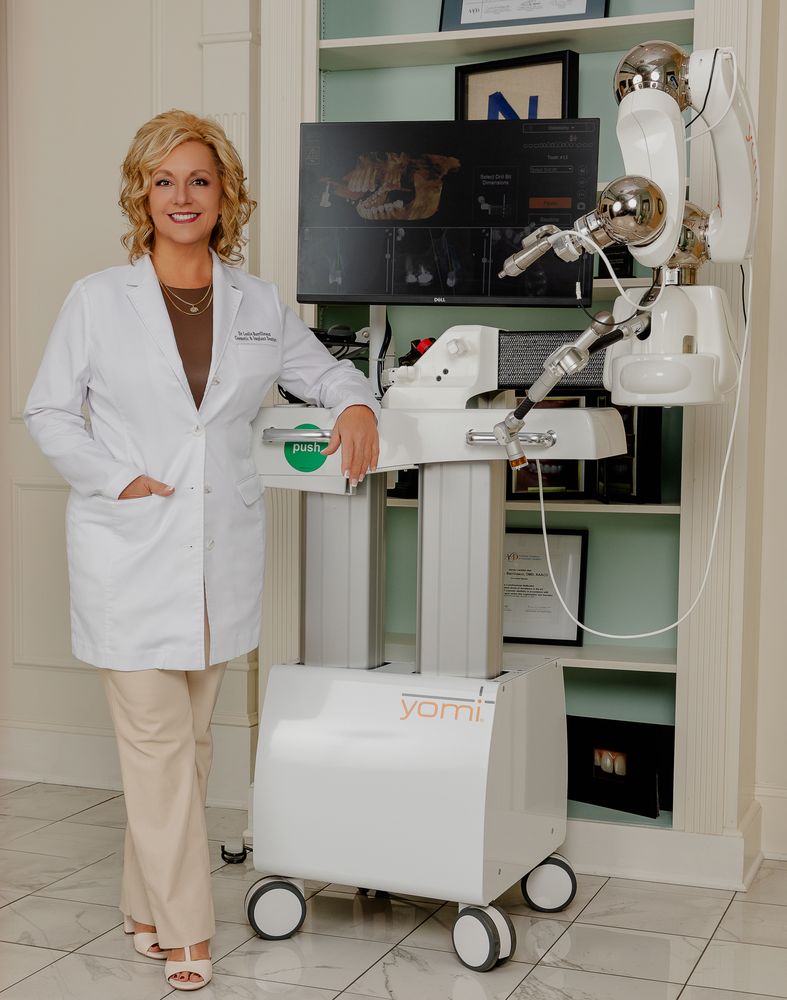
You’re mid-bite when it happens. That sound, like a tiny crack of thunder inside your mouth. A second of confusion. Then your tongue finds it: a sharp edge where smooth enamel used to be.
Naturally, you wonder if it’ll somehow… fix itself. Heal over, maybe?
Here’s what most people don’t realize until they’re sitting in a dentist’s chair: enamel doesn’t regenerate. It’s the toughest substance your body produces, yes, but also the least forgiving when damaged. Skin heals. Bones mend. Enamel? Once it’s gone, it’s gone.
But, and this matters, modern cosmetic dentistry has gotten really good at fixing these things. Chipped teeth are something we handle constantly. The repairs look natural, they’re quick, and catching them early keeps a minor chip from turning into a major headache.
Can Chipped Teeth Grow Back?
Short version: no. Missing tooth structure won’t regenerate on its own.
Longer version: each layer of your tooth behaves differently, and understanding that helps you know what’s fixable and what needs professional help.
Why Teeth Can’t Repair Themselves
Evolution made a trade-off with enamel. Maximum hardness, zero healing capacity.
The composition is 96% hydroxyapatite crystals, basically mineralized armor designed for crushing food and resisting acid attacks. That density? It comes at a cost. No blood vessels thread through enamel. No nerve supply exists. Living cells can’t survive in that crystalline structure, which means repair nutrients never reach the surface.
When a chip forms:
- No blood flow triggers healing
- Living cells don’t exist in the structure
- Growth factors can’t signal regeneration
- The crystal network won’t reform once fractured
Dentin, the layer beneath, does contain living cells called odontoblasts. They can create a thin protective barrier when irritated, your tooth’s version of “I’ll patch what I can.” But that natural response won’t replace missing enamel or restore original contours.
Your body reinforces what remains. It can’t bring back what’s lost.
Enamel, Dentin, and Pulp: Each Layer’s Role
Think of your tooth as having three zones with different jobs:
Enamel: Outer armor. Hard, smooth, mineralized. Protects softer layers but heals nothing.
Dentin: Supporting core. Slightly softer, yellowish, riddled with microscopic tubules connecting to nerve tissue. Can form limited “repair dentin” but not full regeneration.
Pulp: Inner life source. Nerves, blood vessels, connective tissue live here. Heals minor inflammation but not severe trauma or exposure.
Enamel contains no living tissue and cannot regenerate, offering zero repair ability. Dentin does contain living tissue and has limited regeneration capacity, though its repair ability remains minimal. Pulp contains living tissue with the ability to regenerate and provides moderate repair capability when damaged.
Each plays its part. Once enamel breaks, though? Natural repair isn’t an option. That’s where restorative dentistry steps in.
Remineralization vs. Regrowth
Confusion often starts here. You’ve probably seen toothpaste commercials promising to “repair enamel.”
Technically, that’s remineralization. Not regrowth.
Your mouth runs a built-in maintenance system. Saliva constantly bathes your teeth, depositing calcium and phosphate minerals to strengthen areas weakened by acid or early decay. Add fluoride to the mix, and those minerals form fluorapatite, tougher and more acid-resistant than the original structure.
Remineralization can:
- Reinforce weakened enamel
- Reverse very early decay
- Smooth microscopic defects
It can’t:
- Rebuild missing enamel
- Fill chips or cracks
- Restore contours
Think of it like sealing hairline cracks in a driveway. Helpful for maintenance. But it won’t replace a missing chunk of pavement. Chipped enamel needs professional repair, not just stronger toothpaste.

What to Do Right After Chipping a Tooth
Best outcomes start with what happens in those first hours. Here’s what we tell patients who call our Huntsville office after an accident:
- Rinse gently with warm salt water to keep the area clean.
- Avoid biting down on the chipped side.
- Sharp edge poking your tongue? Cover it with dental wax or sugar-free gum to protect the soft tissue.
- Save any tooth fragments in milk or saliva if possible.
- Stick to soft foods until your dentist can examine the area.
Even small chips deserve attention. They trap bacteria, cause sensitivity, and weaken nearby enamel.
Dental Treatments for Chipped Teeth
Good news? There’s almost always a comfortable, natural-looking fix.
Here’s what we typically recommend in our practice:
Bonding works best for small chips or surface wear, lasting anywhere from 3 to 10 years. Costs typically range from $100 to $400 per tooth, and insurance often covers 50 to 80% if the procedure is restorative rather than purely cosmetic.
Veneers are ideal for front teeth or cosmetic repairs, offering durability of 10 to 15 years. Expect to pay between $800 and $2,500 per tooth, though insurance usually won’t cover veneers since they’re considered cosmetic.
Crowns handle large breaks or structural loss and can last 15 to 30 years. Costs range from $800 to $3,000 per tooth, with insurance typically covering about 50% if the crown is medically necessary.
Dental Implants address severely damaged or missing teeth, lasting 20 years or more. Costs vary significantly, and insurance often provides partial coverage.
Actual costs vary by materials, location, and procedure complexity.
If the chip affects your bite or causes discomfort, insurance may classify it as restorative. Cosmetic repairs, purely for aesthetics, usually come out-of-pocket. We help patients explore flexible payment options so cost doesn’t prevent necessary care.
Our restorations? Color-matched, digitally designed, and crafted with precision. They blend seamlessly into your natural smile.
Caring for a Repaired Tooth
Once restored, maintaining your tooth is simple. Important, though.
Avoid biting ice, pens, or fingernails.
Chew soft foods for the first day or two.
Brush gently using a soft-bristled toothbrush.
Keep up routine cleanings to monitor the repair.
Many patients are surprised how natural bonded or crowned teeth feel. Within days, it’s easy to forget which one was repaired. Which is exactly the point.
Long-Term Outlook and Prevention
No one plans to chip a tooth. But a few small habits make a big difference.
Try these:
- Wear a mouthguard during contact sports.
- Use a nightguard if you grind your teeth.
- Don’t chew ice or hard candy. (It’s one of the top causes.)
- Stick to fluoride toothpaste to maintain strong enamel.
- Schedule routine cleanings twice a year.
According to the American Dental Association, regular checkups help catch tiny enamel fractures before they turn into visible chips, saving both tooth structure and cost later.

Frequently Asked Questions
Can a chipped tooth grow back naturally?
No. Once enamel is gone, it can’t regrow — it’s not living tissue. But the good news is, your dentist can easily restore the look and strength of the tooth with bonding, veneers, or a crown.
My chipped tooth doesn’t hurt — do I still need to fix it?
Yes. Even small chips can collect bacteria or worsen over time. If it’s painless, it’s not urgent, but it’s still smart to schedule an exam soon.
Can toothpaste or diet help repair a chipped tooth?
No toothpaste or diet can rebuild missing enamel. However, fluoride toothpaste and a balanced diet can strengthen the surrounding enamel and protect against further damage.
How do dentists fix a chipped tooth?
Treatment depends on the chip’s size. Minor chips often just need bonding or smoothing. Larger ones may need veneers or crowns to restore full function and appearance.
Is it expensive to repair a chipped tooth?
It’s usually less costly than people think. Small chips are quick, affordable fixes, and most cosmetic or restorative options can be done in one visit.
When to Call a Dentist
Experiencing pain, sensitivity, or swelling after chipping a tooth? Don’t wait.
Prompt care can mean the difference between simple bonding and full restoration.
Our Huntsville team is here to help with compassionate, expert care tailored to your situation. Schedule your consultation today and let us help you smile with confidence again.
Disclaimer: The information provided in this blog is for educational and informational purposes only. It is not intended as a substitute for professional medical, dental, or healthcare advice. Always consult with a qualified healthcare provider for diagnosis, treatment, and answers to specific medical questions.

Dr. Leslie Barrilleaux is Alabama’s only Accredited Cosmetic Dentist and the founder of Dentistry Today in Huntsville and Scottsboro. She’s passionate about helping patients feel confident in their smiles through personalized, modern dental care.
